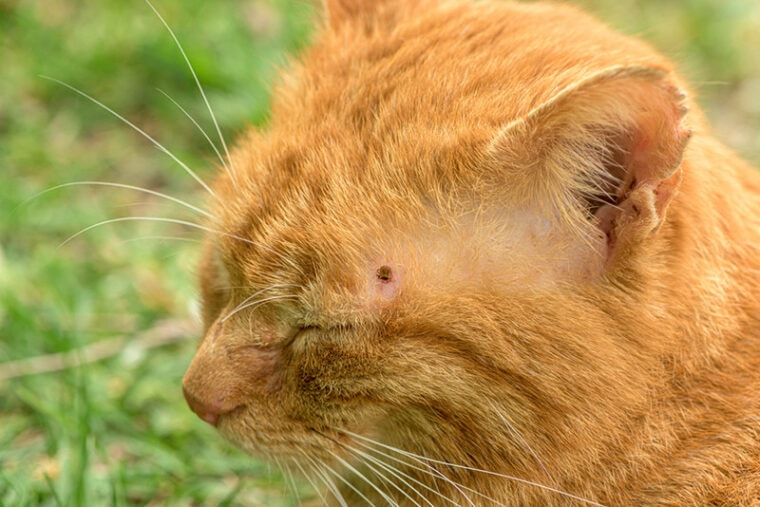
Bug bites can be extremely uncomfortable and irritating for cats. They can be itchy and make the skin feel tender and extra sensitive. If you notice your cat engaging in increased licking and scratching on certain areas of its skin, there’s a chance that it may be trying to alleviate a bug bite.
Not all bug bites warrant a visit to your veterinarian, and there are some home remedies that you can try to save yourself a visit and prevent stressing out your cat any further. Here are some things you can try if your cat has irritating bug bites.
Before You Start
Make sure that the reason your cat is scratching is due to a bug bite. There are plenty of other reasons why cats may have itchy or inflamed skin. Allergies can irritate the skin, and an unhealthy diet lacking in proper nutrition can cause a cat’s coat to feel coarse and dry.
We’ll go over what common bug bites look like. If you don’t suspect that the itching is coming from bug bites, you may need to consult with your veterinarian, who can diagnose the cause of the irritated and inflamed skin.

How to Identify & Treat Bug Bites on Your Cat
1. Identify the Type of Bite
Some of the most common bug bites on cats will be from fleas, ticks, spiders, mosquitoes, flies, mites, and ants. Outdoor cats are also more susceptible to getting stung by bees and wasps, but it doesn’t mean that indoor cats are completely exempt from any stings.
Most bug bites will cause swelling, and you may even find multiple swollen spots, depending on how many times and how many bugs have bitten your cat. Bug bites can also cause skin lesions.
If you notice your cat scratching or licking excessively, search the surrounding area for any signs of bugs. Make sure to also comb through your cat’s coat to look for any bugs. If you suspect a spider bite, call your veterinarian, as some spiders may be venomous.

2. Remove Any Stingers
Gently look through the affected area of your cat’s skin for any stingers from bees. You can use a stiff, flat edge to scrape the stinger. Don’t use tweezers to remove it because squeezing it can release more venom into your cat’s skin.
If the stinger is below the skin, don’t make any attempts to remove it. Sometimes, stingers take time to work their way up to the surface of the skin. So, check your cat’s skin periodically to see if the stinger has been pushed up to the surface. Contact your veterinarian if you have any concerns.
3. Use a Cold Compress
Cold compresses can help reduce and alleviate the swelling. Make sure that there’s a towel that prevents the compress from coming in direct contact with the skin.
4. Apply Hydrocortisone Cream
Hydrocortisone cream is an over-the-counter medication used to help relieve itching and swelling caused by various skin conditions. It’s also effective in soothing skin irritation from bug bites and is commonly applied to mosquito bites.
Make sure to consult with your veterinarian before you rub hydrocortisone cream on your cat’s skin. Sometimes it’s not the appropriate treatment and will be completely ineffective in treating your cat’s skin irritation.

5. Apply Antihistamine Cream
Antihistamine cream is another cream that can be used to treat and alleviate itching from insect bites. Again, check with your veterinarian before using.
6. Use Baking Soda Paste
Baking soda paste is a homemade remedy that can be used to alleviate itchiness from minor bug bites. Start with 1 tablespoon of baking soda and add just enough water to create a thick paste. Then, apply the paste over the bug bite. Let it sit for about 10 minutes before wiping it off.
Since this paste can get messy, it’s best to use it on bites located on your cat’s underside or other areas with less hair.
7. Use a Cone to Prevent Scratching or Licking
Itching and licking may provide temporary relief, but it can cause bites to worsen and may lead to further infection. So, if your cat just can’t resist, you can try having it wear a cone for a few days to allow the bite to heal on its own. Cones are also helpful if you want to apply topical cream to the bites, as they’ll prevent cats from licking away any creams.

8. Avoid Any Harmful Ingredients
Some ingredients found in creams and other remedies can be harmful to cats. For example, calamine lotion shouldn’t be used on cats because it contains zinc, which can be harmful to cats if they ingest it.
Some bug bite products contain ammonia, which is also dangerous for cats and can perpetuate skin issues. It can also affect a cat’s respiratory system if inhaled.
When to Take Your Cat to the Veterinarian
In severe cases, you’ll want to rush your cat to your vet’s office or the nearest emergency vet clinic. Cats can have allergic reactions to bites that can lead to anaphylactic shock. So, take your cat to the vet right away if you see any of the following symptoms1:

 Conclusion
Conclusion
Bug bites can be challenging to deal with as cats will want to keep scratching and licking affected areas. There are a few home remedies you can try to help soothe your cat’s skin, but when in doubt, don’t hesitate to call your veterinarian. It’s better to be safe than sorry and work with a professional who can help treat your cat’s skin irritation and help it heal as fast as possible.
Related Reads:
- How to Prevent Insect Bites on Cats? Are There Insect Repellants for Cats?
- Will Cats Keep Bugs Away? The Surprising Answer!
Featured Image Credit: thka, Shutterstock


 Conclusion
Conclusion



